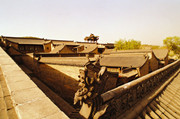The Wudang Mountains 1
( cri.cn )
Updated: 2012-12-21
A: Hello and welcome to "Listeners' Garden" here on China Radio International. I'm Ya Jie.
B: Sitting in for Mark, I'm Luo Laiming, also saying hello to all of you no matter where you are, from our studio here in Beijing.
A: The Wudang Mountains, also known as Wu Tang Shan or simply Wudang, are a small mountain range in China's Hubei Province. In years past, the mountains were known for the many Taoist monasteries found there.
B: The monasteries serve as an academic center for the research, teaching and practice of meditation, Chinese martial arts, traditional Chinese medicine, Taoist agriculture practices and related arts.
A: They also represent the highest standards of Chinese architecture over a period of nearly 1,000 years. So continuing our journey discovering World Heritage Sites in China, we will today visit the sacred mountain of Wudang. But before we do that, let's check our mailbox.
B: This week we received a letter from Finland. Sami Niemel?inen writes in the letter: "I have the pleasure of listening to your radio station in the east part of Finland in a city called Joensuu. The signal quality is good. As I am an Elvis Presley fan, it was very nice to hear the Elvis song called "Don't Be Cruel" during your music program!" Sami also told us in his letter that his hometown had already received its first snowfall of this winter.
A: Hi, Sami, it is great hearing from you, and we here in Beijing also got an early first snowfall of the season when rain and snow swept through the city and the temperature fell to minus-two degrees Celsius.
B: Yanqing County in northern part of the city suffered the heaviest snowfall since 1960. Well, we hope everyone has managed to stay warm and safe in spite of the weather. Now we have a letter from Sweden. Jan Th?rnblom says in the letter:
A: "I am 74 years old, and I live in the central part of Malm? which is a city with about 300,000 inhabitants located in the province Sk?ne in the southern part of Sweden. It is 640 kilometers south of Stockholm and only 30 kilometers east of the capital city of Denmark, Copenhagen."
B: Jan's letter continues as he says: "As my hobby is listening to remote radio stations, I was very pleased to hear your station on 7255 kHz. The signal strength was pretty good, but variable with some interference from other transmitters, yet very little atmospheric noise. Thank you very much for your nice program. I hope this report will be of some use to your technical department."
A: Thank you, Jan, for your technical comments. They are certainly helpful to us. We're more than happy to send you our QSL card to thank you for your detailed report. Our next letter is from the United States. Bruce Portzer caught our program on 1040 kHz medium wave in the town of Grayland in Washington State. Bruce says in his letter:
B: "The broadcast was from a local AM station in Portland that broadcasts CRI's programs 100 percent of the time. My location at the time was about 200 kilometers northwest of the station. The overall signal strength was fair, but varied from good to poor. There was much interference from a station in Vancouver, Canada, on the same frequency. There was a minimal amount of atmospheric noise. The signal faded in and out, often quite good for a minute or two at a time, but also nearly inaudible at times. Sometimes the programs were very listenable, but other times they were not easily heard."
A: But despite the reception challenges, Bruce says in his letter that he enjoyed listening to our programs. Thank you very much, Bruce, for showing interest in our programs and for your helpful information. We will tell the technical department so they can check and fix the problem soon. Of course, we'll send you a QSL card to confirm your report.
B: The next letter is also from the U.S. Alan Anderson monitored our show "China Drive" and says in his letter: "In the program, you had a guest, Cindy, talking about young people in Australia learning not only a second language, but the culture of that country, and not only by textbook, but also by using shortwave. It also talked about a couple using 100-year-old machinery to print and displaying it in a window for all to see. Very creative. I'm a big believer in hands on. A country is stronger when it promotes both the trades and 'white-collar' workers."
A: Abdulkadir Ibrahim from Nigeria is also a fan of "China Drive." He heard the edition that featured a discussion about child abuse by schoolteachers. He says he "was shocked to hear such reports" and he hoped measures would soon be taken to resolve such problem.
B: Thank you both, Alan and Abdulkadir, for sharing your understanding about our programs. In fact, the child abuse that Abdulkadir talked about has drawn wide attention in China.
A: The news came after some photographs of teachers abusing students went viral. One picture shows one of the accused teachers lifting a student off the ground by his ears, with the boy screaming in pain.
B: Another such photo shows a child whose mouth was apparently taped shut. And yet more photos depict students thrown upside-down into trashcans or forced to stand naked. The abuse was captured on the classroom's security camera at a privately owned kindergarten in Zhejiang Province.
A: Two teachers involved in the abuse were arrested. The news came after a teacher in Shanxi Province was detained after being filmed by a surveillance camera slapping a five-year-old girl in the face 70 times for being unable to solve a math problem. B: Both incidents have outraged China's online community. Many people have put the spotlight on the behavior of preschool teachers, while some netizens have called for better monitoring in classrooms.
A: The two cases may not be isolated events. Some industry insiders say abuse of students is a common problem, particularly at unlicensed preschools, many of which hire unqualified staff because of the dire shortage in China of qualified preschool teachers.
B: Because of a lack of investment, the number of private, unregulated kindergartens is greater than that of state-funded ones in many places in China.
A: And low wages offered by private kindergartens often lead to a shortage of qualified staff. In Zhejiang alone, an estimated 40 percent of the roughly 100-thousand teachers in kindergartens have no teaching qualifications.
B: At the same time, there is currently no criminal law that deals specifically with child abuse in China. While the criminal code covers abuse that occurs within a family, the punishment for outsiders, such as teachers or caregivers who abuse children, is administrative detention for up to 15 days.




